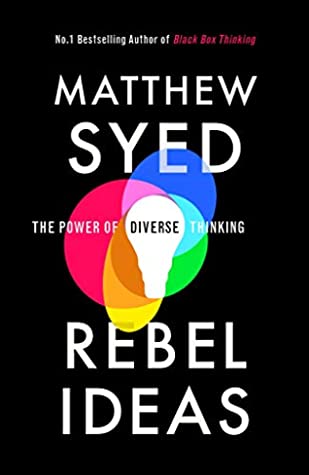I feel that this book really resonated with my own thoughts around the importance of diversity in groups and teams.

Matthew Syed’s Rebel Ideas: The Power of Diverse Thinking is a book that examines how effectiveness and output can be dramatically altered through building teams that contain diverse thinkers.
The book considers a number of examples - from both the past and present - and compares and contrasts scenarios where teams expressing different proportions of diverse thinkers can change their performance; sometimes with life-threatening consequences.
One of the most interesting concepts discussed by the author is that around problem spaces. When solving challenges, there is a cognitive space that must be considered and approached in order to produce a more effective outcome. By recruiting diverse thinkers, there is less overlap in each individuals’ own representation of the space, and therefore more of the space can be explored.
Overlap in the space can even be dentrimental to the performance of the group. If there is sufficient overlap, then those members will simply reaffirm each others’ thoughts and ideas to the point where these opinions become dominant and drown out the inputs from members occupying other areas of the space.
In relation to this, the book considers the example of a sprint relay team. In this type of scenario, you’d want to involve the four fastest sprinters you can find - no matter their background - in order to win the race. However, in cognitive challenges - for example, to accurately create financial forecasts - teams consisting of a number of people from different financial backgrounds, models, and ways of thinking, out-performed the individuals known to be “the best in the game”.
Interestingly, the author also analyses how cultural diversity can (but doesn’t always) impact cognitive diversity. In many scenarios, people from different cultural backgrounds may develop their own ways of thinking through their families, social groups, and education.
On the other side of this, two people from different cultural backgrounds, but who attended the same university and were tought the same models by the same lecturers, are likely to inhabit the same area of the problem space, and thus overlap in their ability and knowledge.
There are many more examples considered by the book, and I can strongly recommend reading it - particularly if you manage or frequently work in a team yourself. The general upshot is that the rebel ideas - i.e. those ideas that are truly innovative and ground breaking - are more likely to emerge from teams of people that think different.
